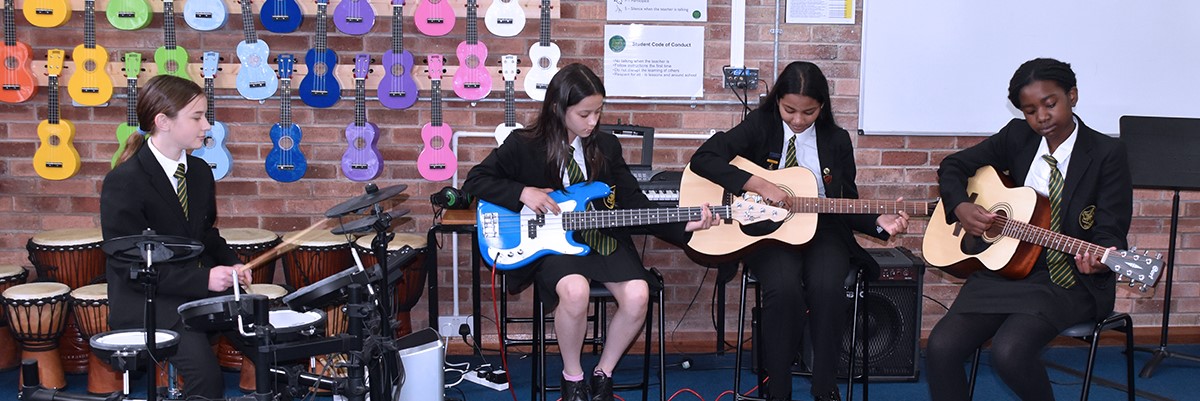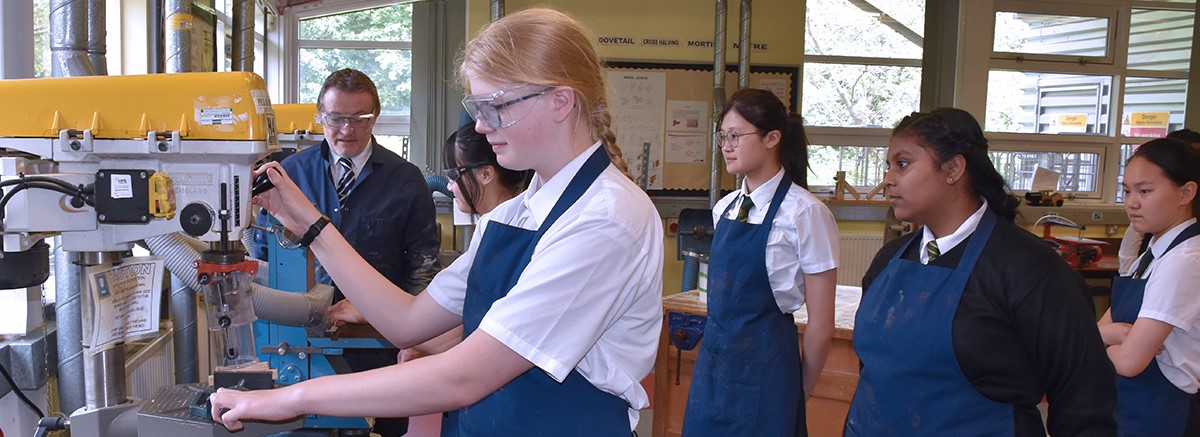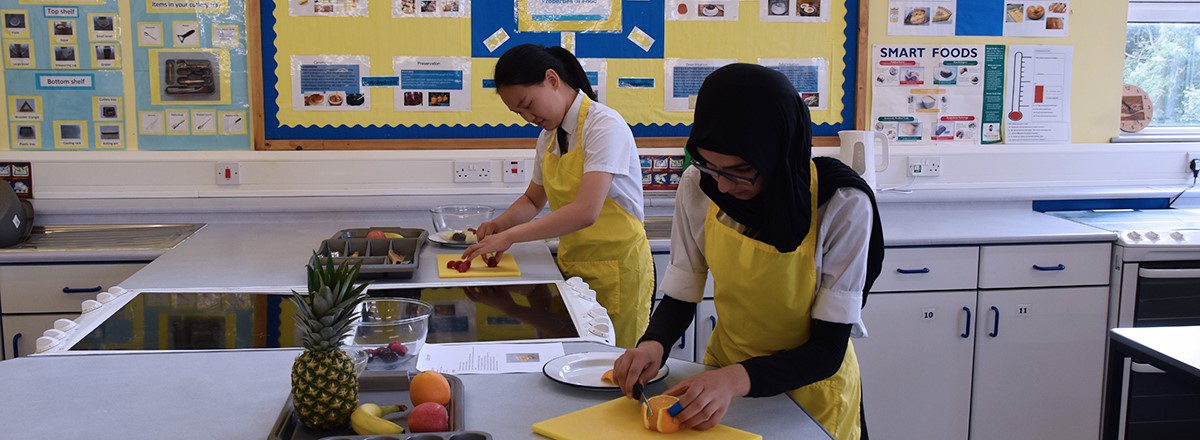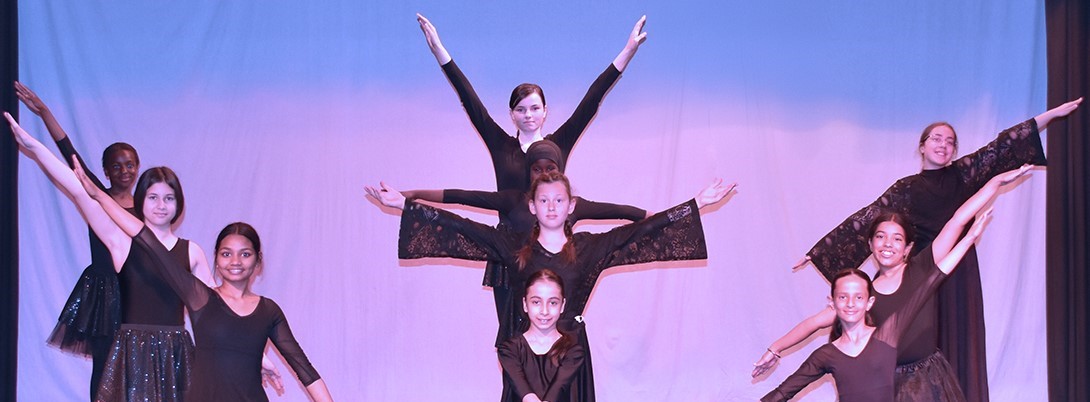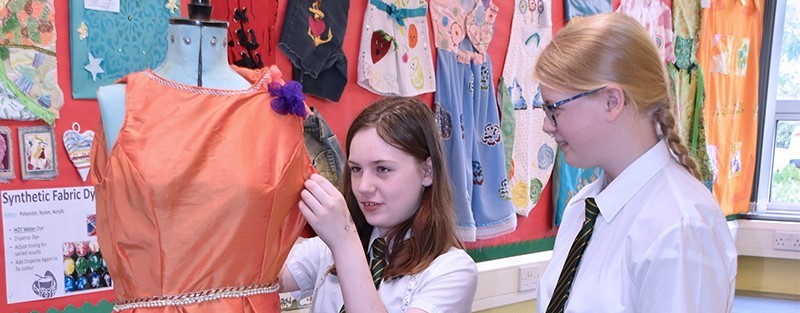Music
KEY STAGE 3 CURRICULUM
All pupils study music at Key Stage 3, after which it is an option subject at GCSE. Pupils taking GCSE Music receive instrumental or vocal lessons in school free of charge. The implementation of the curriculum must, necessarily, take into account a number of contextual factors in the school which affect the design of the curriculum:
- National frameworks such as the National Curriculum.
- Pupils’ prior learning and potential: Some pupils enter the school with a significant level of background musical ability – these pupils frequently need to be significantly challenged in lessons. o A number of pupils take up an instrument upon entering the school – these pupils will often progress quickly.
- A large proportion of pupils enter the school with limited musical knowledge. Expected progress through primary education as detailed in the Model Music Curriculum is rare. Although the starting point in Year 7 is, frequently, low, the general ability of pupils means that progress should be significant across Key Stage 3. A number of pupils opt for GCSE Music purely based on their classroom Music experience.
- The diversity of cultural heritages within the school.
- The broader culture of the school: academically and otherwise.
- The resources available.
- The planning, delivery and assessment of the curriculum in the context of how this can be managed with a regard to reasonable workload for staff.
- The assessment framework of the school (including formal examinations).
- What repertoire would both speak to, and challenge, pupils.
KEY STAGE 3 Pupils receive two lessons over two weeks in Year 7 – 9. The ability range and the experience of music can be very wide in Year 7. KEY STAGE 4 Pupils receive five lessons over two weeks. We study the Eduqas GCSE course which is divided up into Performing (30%), Composing (30%) and Listening (40%).
Click here for - Music Department Handbook.
Year 7 - Foundational and transitory musical skills and knowledge
Term 1a - What is music?
Pupils complete baseline tests in listening, performing and composing music.
Term 1b - Javanese Gamela
Pupils compose and perform as part of a Javanese gamelan ensemble. This is used to develop ensemble performance skills.
Term 2a and 2b - The Orchestra
Pupils learn to read staff notation and then perform as an orchestra to develop ensemble skills. Pupils learn to identify different instruments in the orchestra and are assessed on their listening skills.
Term 3a Arriba from Jazz in the classroom
Pupils create a whole class performance of ‘Jazz in the classroom’ reading notation.
Term 3b Personal Project
Pupils rehearse and perform a piece of their choosing. For most pupils this will be a piece on the keyboard, guitar or voice. Pupils who learn an instrument outside of the classroom will use this time to compose a piece to a set brief in the given rehearsal time.
Year 8 Chords and Harmony
Term 1a Mande Drumming
Pupils compose and perform as part of a Mande drumming ensemble
Term 1b Arriba from Jazz in the classroom
Pupils create a whole class performance of ‘Jazz in the classroom’ reading notation.
Term 2a and b Baroque music
An introduction to the Baroque era – in particular, pupils develop keyboard skills by learning a piece of Baroque music and compose using a ground bass. Pupils learn to read the bass clef.
Term 3a Blues music
Pupils look at the genres of blues and jazz, including well known structures (12 bar blues) and scales (blues scale) and perform a piece in an ensemble.
Term 3b Personal Project
Pupils rehearse and perform a piece of their choosing. For most pupils this will be a piece on the keyboard, guitar or voice. Pupils who learn an instrument outside of the classroom will use this time to compose a piece to a set brief in the given rehearsal time.
Year 9 Finding your musical self
Term 1a Film Music
Pupils explore different styles of music used in films. Pupils will compose a horror soundtrack.
Term 1b EDM
Pupils explore sequencing and music technology through the genre of EDM.
Term 2a Cover music
Pupils create a musical cover of a Samba piece to develop ensemble skills.
Term 2b Composing a Pop song.
Pupils compose a bassline, chords, drumbeat and riff using music technology.
Term 3a and b Personal Project
Pupils rehearse and perform a piece of their choosing. For most pupils this will be a piece on the keyboard, guitar or voice.
Pupils who learn an instrument outside of the classroom will use this time to compose a piece to a set brief in the given rehearsal time.
Pupils also could submit a written assignment on a style of music of their choosing.
Key Stage 4 Curriculum
GCSE Music Option Subject
COURSE CONTACT: Mr D Nock
Exam board website: https://www.eduqas.co.uk/qualifications/music/gcse/eduqas-gcse-music-spec-from-2016-d.pdf
Course Content
Year 10
|
|
Autumn Y10 |
Spring Y10 |
Summer Y10 |
|
Performing |
Pupils continue their instrumental or vocal studies with their Visiting Music Teacher. Pupils perform a solo or ensemble piece in class as part of a formal assessment. Pupils also perform holistically through composition tasks. Pupils are also expected to perform as part of the extra-curricular life of the school or/and external institutes. |
||
|
Composing |
Language for Learning
Pupils look at foundational theoretical knowledge needed for the programme of study, alongside basic compositional skills.
Pupils complete an appropriate composing task using musical forms and devices. |
Composing to a Learner Determined Brief
Pupils complete a composition to a brief set by themselves, which forms 15% of their final GCSE mark.
This will be submitted in the Autumn term.
|
|
|
Listening and appraising |
AoS1: Musical forms and devices. AoS2: Music for Ensemble Pupils study music from the Baroque, Classical and Romantic Eras. Pupils study the set work Badinerie and complete a listening test on this piece |
AoS4: Popular music AoS2: Music for ensemble Pupils explore different styles of popular music. |
Examination Practice Pupils practice listening and appraising style examination papers based on Eduqas AoS1, 2 and 4. |
Year 11
|
|
Autumn Y11 |
Spring Y11 |
Summer Y11 |
|
Performing |
Pupils perform and submit either a solo or ensemble performance which forms 15% of their final GCSE mark. |
Pupils perform and submit either a solo or ensemble performance which forms 15% of their final GCSE mark. |
|
|
Composing |
Composing to a Set Brief Pupils complete a composition to a brief set by the board, which forms 15% of their final GCSE mark. This will be submitted in the Spring term |
|
|
|
Listening and appraising |
AoS3: Film Music Examination Practice Pupils practice listening and appraising style examination papers. |
Review Revisit area of studies which are weaker. This content will differ depending on the cohort. |
Final examination Pupils complete their listening and appraising exam paper set by the exam board. This will form 40% of their final GCSE mark. |
Why Study This Course?
This course provides opportunity to progress onto other music related courses such as A Level Music, a degree and a career as music profession.
Extra-Curricular Music Instrumental and Vocal Music Tuition
Instrumental and vocal lessons are available with our team of 5 well-qualified and experienced specialist teachers. Pupils can apply for this via our Parent Mail form.
Commencement
Lessons commence at the start of each full term.
Cost
The fee for lessons is £25 per term. This figure is reviewed annually. Lessons are paid termly or annually using Parent Mail.
Exemptions
Pupils who qualify for Pupil Premium, or who take GCSE Music are entitled to free tuition.
Scheduling
Pupils will receive individual lessons of 20 minute or paired lessons of 30 minutes.
*Steel Pan and Dhol drum lessons are taught as an ensemble so will be taught in small groups for 30 minutes.
Lessons
A minimum of 30 lessons will be offered over the academic year.
Lessons are scheduled on a rotating basis so that pupils do not miss the same lesson repeatedly.
Instrument Hire
We have a small stock of school instruments which can be hired. Please enquire with the Head of Music (dnock@hillcrest.bham.sch.uk). These are generally considered ‘starter’ instruments and should only be kept for a short period of time. We ask all families to consider buying an instrument after a maximum of a year.
We cannot guarantee availability of an instrument and we will look into the possibility after you have requested lessons. We do not keep a stock of some instruments.
Events
The department runs a number of concerts and events throughout the year. Pupils should attend as required.
Examinations
Pupils are encouraged to take examinations in music. They are useful in providing a goal to work towards and indicate the standard attained. Parents/carers will be consulted when we believe it would be a good idea to enter. The decision of whether to go ahead will involve the pupil, parent/carer and teacher.
Notice
A half term’s notice is required to cancel lessons. Lessons can only be stopped at the end of each full term. This gives due warning to the teacher and ensures that the space can be used by another pupil. Parents/carers should write to the Head of Music (dnock @hillcrest.bham.sch.uk) before the final day of the preceding half term (e.g. to cancel lessons from the Spring Term onwards, the school needs to be notified by the last school day of the first Autumn Half Term). Refunds cannot be issued on lessons already paid. The school also reserves the right to cancel the lessons of any pupil who does not use their lessons profitably or who does not adhere to the terms of the Agreement.
Ensembles and Choirs
|
Steel Band |
Mr Clarke |
Apply via parent mail letter |
TBC |
Hall
|
|
Dhol Drums |
Mr Singh
|
Apply via parent mail letter |
TBC |
Hall |
|
Advanced Choir |
Mrs Francis |
By Audition |
TBC |
R12 |
|
Blues and Jazz Band |
Mr Nock |
Open to all (Capacity 15 Pupils) |
Wed 15.30 – 16:15 |
R12 |
Music Reading List
PEPA Careers in the Curriculum Priorities'
PEPA intent:
Career intent statement for PEPA:
1 – Identify and demonstrate different employability skills
2 – Develop an understanding of career based roles and responsibilities within our subjects
3 – To create a careers display advertising jobs within our subject
4 – To engage pupils with professionals in our industry

